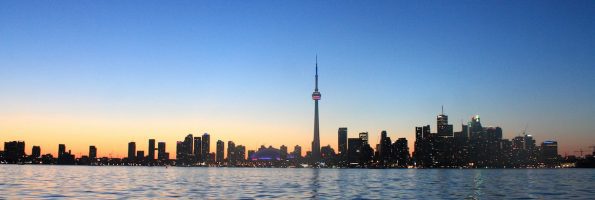Toronto MBAs that DO NOT Require Work Experience

Getting into a top-notch MBA program is a huge undertaking. You have to ace your test scores, provide glowing academic transcripts, garner appropriate letters of recommendation, write intelligent essays and somehow impress the admissions office during an interview. It’s a daunting task to say the least. And it’s even more intimidating if you’re a recent bachelor’s grad with little to no work experience.
If you’re sweating over getting into an MBA program, we’re here to make your decision a little bit easier. We understand that it’s enough to sweat the GMAT/GRE, you don’t need to sweat a job too. So, to help simplify your application process, we’ve vetted the top Toronto MBA programs to find the ones that don’t require you to have work experience.
If you’re interested in more schools that don’t require work experience for their MBA programs then see our MBAs without work experience guide or our Canadian schools that don’t require work experience for their MBA programs page.
DeGroote School of Business – McMaster University
Work experience is required for all international applicants and for domestic applicants applying for the full-time MBA and accelerated MBA programs. Domestic applicants do not need work experience when applying to the co-op program. However, only one year of full-time, continuous work experience is required. Also, for graduates from a North American university, DeGroote will consider an undergrad co-op or internship placement (totaling 12 months) in place of work experience.
As for why DeGroote requires work experience, they feel that their students are most effective when they’re able to pull from their own professional experiences and background. It helps its MBAs to be able to contribute to group work and discussions.
Ivey Business School – Western University Canada
The full-time and accelerated MBA programs require a minimum of two years of work experience. However, don’t let that stop you. The key for Ivey is that they want MBA candidates who can contribute to the classroom experience and discussions with maturity and context. Also, Ivey admits that they will accept applications with slightly less than two years of work experience. So, if you’ve only worked for a year and a half, you can still apply.
Rotman School of Management – University of Toronto
At the Rotman School, while two years of work experience are recommended, there is no minimum requirement for the full-time MBA program. That means that recent undergraduates are more than welcome to apply. However, all applicants should be aware that the average full-time MBA candidate has 4.1 years of work experience. As for the part-time MBA program, applicants are required to have two years of experience and most students have at least six years behind their belt.
Schulich School of Business – York University
If you’re interested in attending Schulich, a minimum of two years of relevant post-degree full-time work experience is required. However, that doesn’t mean you’re out of luck if you don’t have the necessary experience. The admission committee also accepts life experience. In special cases, you can apply for the MBA program is you have two years of experience volunteering overseas or you successfully completed a 2-year masters program. Also, co-ops or internships that were completed as a formal part of your degree, and noted in your transcript, can be counted for up to 12 months of work experience.
Ted Rogers School of Management – Ryerson University
While the Ted Rogers School requires two-years of work experience, there doesn’t appear to be a full-stop if you apply directly after undergrad. According to the school’s FAQ page, students can apply to the MBA program directly after undergrad, they just have to understand that preference will be given to applicants who have a minimum of two years full-time work experience.
Lazaridis School of Business and Economics Wilfrid Laurier University – Toronto Campus
If you’re a recent undergrad, the Lazaridis School can be a viable MBA of choice with no work experience, at least for those that decide to attend the full-time MBA program with co-op. For both domestic and international students, no work experience is required for the co-op and, in fact, the maximum amount of work experience allowed is two years (no exceptions). As for the full-time MBA program, two years of work experience is required and, unfortunately, part-time and summer employment does not count. However, the school will accept six co-op work terms during your undergrad.
So, to recap, for recent undergrads the best “no work experience” schools in Toronto are:
- The DeGroote School of Business does not require work experience for domestic co-op MBA applicants.
- The Rotman School of Management has NO work experience requirement for the full-time MBA.
- The Lazaridis School does not require work experience for domestic and international co-op MBA applicants.
Industry Spotlight: Toronto’s Finance Sector

When looking at metros with bustling financial sectors and companies, New York is often is the first to come to mind. But how about our neighbors to the north? Toronto, Canada is also considered one of the world’s fast-growing financial hubs. Continue reading…
Ted Rogers School Competes in the The Economist Case Study Competition

The Ted Rogers School of Management at Ryerson University is the only Canadian MBA program to have entered the Case Study Competition 2016 for The Economist. The competition is based on a case study from Real Vision—the world’s only video-on-demand channel for investing. Competing schools select three students to collaborate and produce a detailed analysis and a five-minute video to support their investment thesis.
Real Vision is the Netflix of the finance world. Their content features exclusive in-depth interviews and presentations from independent analysts, fund managers, investors, and economists. Their goal is to release fresh content each week and to present their its viewers with the best economic and financial insight available.
A first, second, third, and people’s choice winner will be chosen with prizes totally in $21,000.
- First Place: Receives $10,000, a trophy from The Economist and a special showcase of their case study on Real Vision.
- Second Place: Receives $5,000
- Third Place: Receives $3,000
- People’s Choice: Receives $3,000
The top five videos submitted to the competition will be aired on Real Vision, and the top three teams will be selected. The challenge is simple and straightforward, “Walmart Vs. Amazon: Which stock would you choose to invest in if you couldn’t sell it for a decade, and why?” Schools have to answer the question with comprehensive support to confirm their answer.
According to the challenge summary, teams will have to answer five questions in their response:
- Which of the two companies is the market mispricing and why?
- What changes must Walmart make to effectively compete in the Internet age?
- Will Amazon be able to convert ubiquity into profitability?
- Does profitability matter?
- How would you structure your investment into your chosen company?
The Ted Rogers School team chose Walmart as the better value investment, with a 93% return on investment over ten years—increasing to 127% with dividends. The three participants are current MBA students at Ted Rogers school: Jesse Berger, Krysten Connely, and Saad Rahman. You can read the team’s full presentation and watch their video online. And don’t forget to vote for Ryerson University for People’s Choice.
